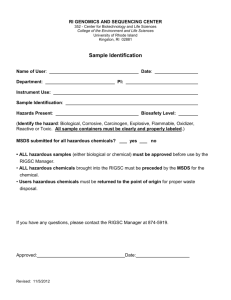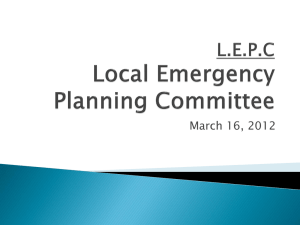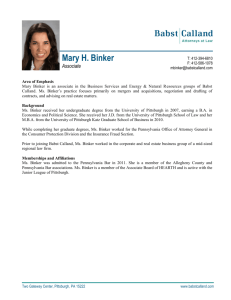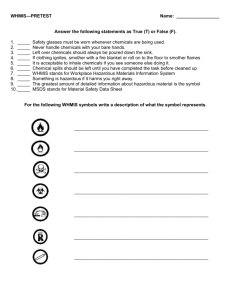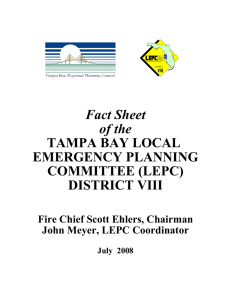United States Senate
advertisement
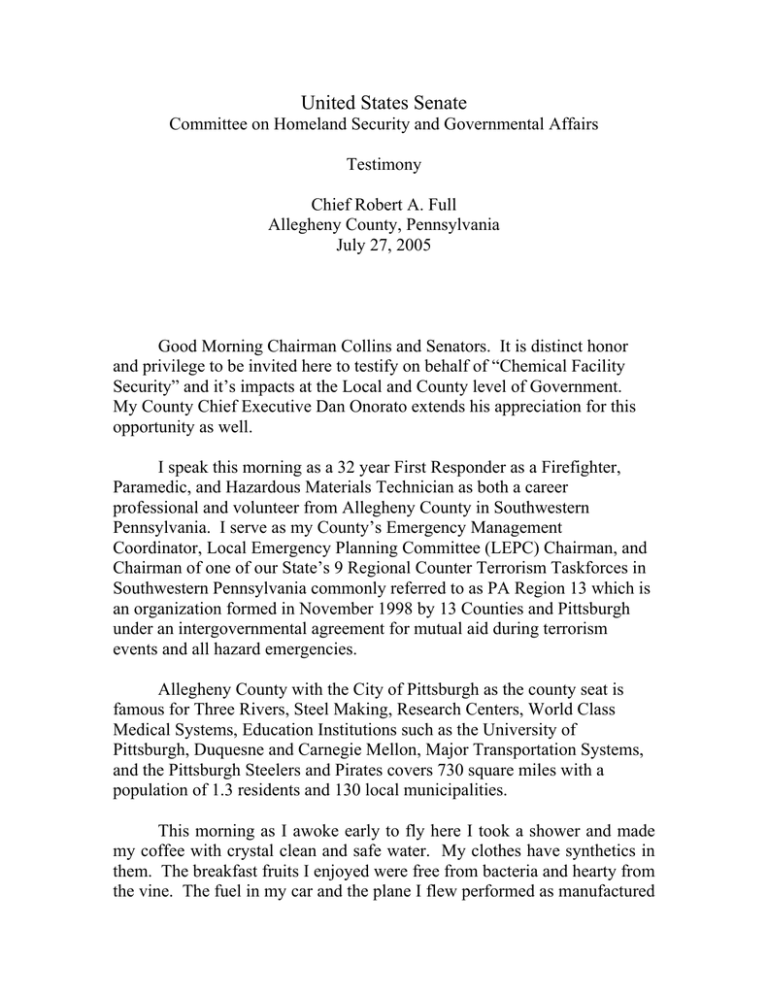
United States Senate Committee on Homeland Security and Governmental Affairs Testimony Chief Robert A. Full Allegheny County, Pennsylvania July 27, 2005 Good Morning Chairman Collins and Senators. It is distinct honor and privilege to be invited here to testify on behalf of “Chemical Facility Security” and it’s impacts at the Local and County level of Government. My County Chief Executive Dan Onorato extends his appreciation for this opportunity as well. I speak this morning as a 32 year First Responder as a Firefighter, Paramedic, and Hazardous Materials Technician as both a career professional and volunteer from Allegheny County in Southwestern Pennsylvania. I serve as my County’s Emergency Management Coordinator, Local Emergency Planning Committee (LEPC) Chairman, and Chairman of one of our State’s 9 Regional Counter Terrorism Taskforces in Southwestern Pennsylvania commonly referred to as PA Region 13 which is an organization formed in November 1998 by 13 Counties and Pittsburgh under an intergovernmental agreement for mutual aid during terrorism events and all hazard emergencies. Allegheny County with the City of Pittsburgh as the county seat is famous for Three Rivers, Steel Making, Research Centers, World Class Medical Systems, Education Institutions such as the University of Pittsburgh, Duquesne and Carnegie Mellon, Major Transportation Systems, and the Pittsburgh Steelers and Pirates covers 730 square miles with a population of 1.3 residents and 130 local municipalities. This morning as I awoke early to fly here I took a shower and made my coffee with crystal clean and safe water. My clothes have synthetics in them. The breakfast fruits I enjoyed were free from bacteria and hearty from the vine. The fuel in my car and the plane I flew performed as manufactured thank goodness, and as I look around here I see so much of the positives and the need for a strong and safe chemical industry. It has been said and reinforced that one of the main reasons that the United States enjoys the highest standard of living is thru it use of chemicals in all aspects of our daily lives. On behalf of those I represent and myself we couldn’t agree more in the need to support and protect the Chemical industry. As a First Responder paramount to the success of doing your job is to be able to protect, save lives and property during emergencies. An individual comes into Public Safety as a first responder and he/she is primarily trained to deal with the aftermath of an event which was caused by accident, act of god, or intentionally. Every day in this country the men and women of all our Public Safety Departments (Police, Fire, EMS, 9-1-1) demonstrate great courage and conviction to be the best that they can be. These folks plan, train, exercise, and respond to any emergency no matter what the case. No matter how good a Public Safety organization is there will be times that their training, skills, knowledge and capabilities will be overwhelmed or they may not have the expertise to deal effectively with the situation. To minimize this scenario having a strong emergency plan and relationships with pertinent persons in advance pays dividends each day at the local level across America. It’s cliché, but it’s not the time or place to exchange business cards during the emergency. I would like to focus now on Chemical Safety. In 1986 the Federal Government enacted the SARA Title III, “Emergency Planning and Community Right to Know Act. The overall success of this law can not be over stated, and can be measured in my County and throughout the Country by the reduction in chemical spill emergencies, better informed employees and responders during emergencies, Federal, State, and Local Government input and Coordination, and so much more. In my 32-year career I have had an opportunity to specialize in Hazardous Material emergencies. I was the first Chief of the City of Pittsburgh Hazardous Materials Team and held that position for 13 years. Today, I oversee 5 Hazardous Materials Teams in my County. I have logged over 2,000 hazardous material calls. I come to see first hand the potential life threatening situations that are involved when chemicals are accidentally or intentionally released from their containers and processes. The chemicals and materials are found in fixed facilities during production, transfer, and storage along with the transportation to and from market via highway, railroad, water, air, and pipeline. Responding to chemical spills requires quick informed decision making along with specialized tools and equipment. Incidence of vapor clouds, running liquid spills, unidentified products and fires severely complicate local response actions. Many times to the point that a community may not be able to react fast enough to save it’s residents. Transportation accidents involving chemicals provide even a greater challenge as they move in and out of our neighborhoods, by our schools, homes and places of business. SARA Title III targeting fixed chemical facilities followed by similar legislation in our case enacted by the Commonwealth of Pennsylvania has directly contributed to saving lives, property, and environment. The SARA Law has allowed us to be “proactive” through planning, training, and networking versus “reactive” in always responding to the unknown and not knowing the players when you get there. The Federal Government has served us all well with this law, but we need to update some of the provisions to meet the needs of today. I believe we all knew it would come some day. Never did any of us expect it to come in a manner so coordinated with such devastating results. It did, and we should of learned from it and not forget. I was always told by my Father that mistakes and accidents can and will happen. Most importantly you learn and work to make sure you don’t make the same mistake twice. We may of missed it the first time to a degree, but let’s do everything to prevent it from happening a second time. The next time when it comes we are told by the Top Security minds in our Governments it may be greater in magnitude with even more loss of life and property. Utilizing Weapons of Mass Destruction (WMD) involving Chemicals, Biological, Nuclear, Radioactive, and Explosive devices. We need to get and be ready, now. At the Local Government and First Responder levels we are concerned that we that our residents believe that we can protect them effectively against the threat of WMD, which could easily be one of our Chemical facilities. Our men and women on the front lines in our communities have been working hard in getting some of the special training and have begun to reap the benefit of some of the generous Homeland Funding made available by this Congress and President by putting new specialized equipment in the hands of the First Responders and Local Governments. The sharing of intelligence between levels of Governments hasn’t been better. However, we are not were we need to be yet and have a long way to go, but we are better off today than yesterday. Terrorism Threat Assessments and a Uniform Strategy to deal with them are a common requirement and need at all levels of Government. In looking at all the existing and potential hazards and threats to our Communities Chemical Facilities and there Transportation concerns rise with a few to the top. It’s not that we don’t know what’s in the Plant or what being transported in most cases we do, through the impact of Federal and State Laws, but it’s we don’t know for sure what safety and security measures are in place to keep someone or thing from getting to them. Can the “Bad Guy’s” use them against us? The fact is that there are some chemicals and materials if released from their containers for whatever reason or by a terrorist that can cause great injury and death to an unprotected public. We have to make sure that we do everything in our collective powers to make sure that we understand and make Chemical Facilities and there Transportation safe from attack through enhance security assessment and coordination possibly using the frame work of the SARA Title III Law and the Local Emergency Planning Committee’s (LEPC), Joint Terrorism Task Forces (JTTF), and U.S. Department of Homeland Security Specialist’s. In that regard we believe that new Legislation or a revision to SARA Title III is necessary to bring security standardization to Chemical site plans. Chairman and Members of this Committee today you are hearing from some of the most notable and responsible Chemical Companies in our Country. I have had the opportunity work with a number of their response personnel over the years. The companies are top notch, well trained, have excellent plans, in very good financial state, and have in most cases good security systems. Unfortunately, that is not the case around the Country for many of the other Companies. Many smaller Chemical companies often suffer from lack of finances, resources, and do not have good security systems and accountability. The American Chemistry Council has done a good job in stepping up to the plate with providing a voluntary program with materials and training on Chemical Plant Security. A problem exists that first it is “Voluntary” and second, not all Companies belong to the Council. Today, we have an opportunity to be proactive versus reactive. Chemical Plant and their Transportation is an issue that needs and should be addressed on a National level to ensure uniformity. I don’t have the political or legislative expertise on whether a new law or tweaking an old one is the best way to go. I leave that you. I was around in the 80’s when there was great out cry from the Chemical Industry about how the SARA Title III Law was unnecessary and that the industry voluntary program for planning, and response etc. was more than adequate. The Law almost was not enacted. It took a real wake up call. Several thousand lost their lives and tens of thousands were injured in Bhopal, India in 1984 and another incident in West Virginia to raise enough concern to move on the Law. Today we may hear some of the same. Security, trade secrets, plans, products we have heard it all before. What if it gets out? Etc. Together we can work out the details. I don’t know of many trade secrets or critical information given out to competitors or the general public. If so there should be appropriate accountability and even sanctions for those who do. LEPC’s have been a great tool to ensure effective planning and community safety. We can have experienced security people look over plans as necessary. I do not advocate LEPC’s as a policing agency for security, but I do advocate that you cannot appreciate or effectively plan for incidents within your jurisdiction without the full benefit of all aspects of hazards and vulnerabilities. The Public is counting on us. “Shame on all of us if we wait until it’s to late” July 2005
